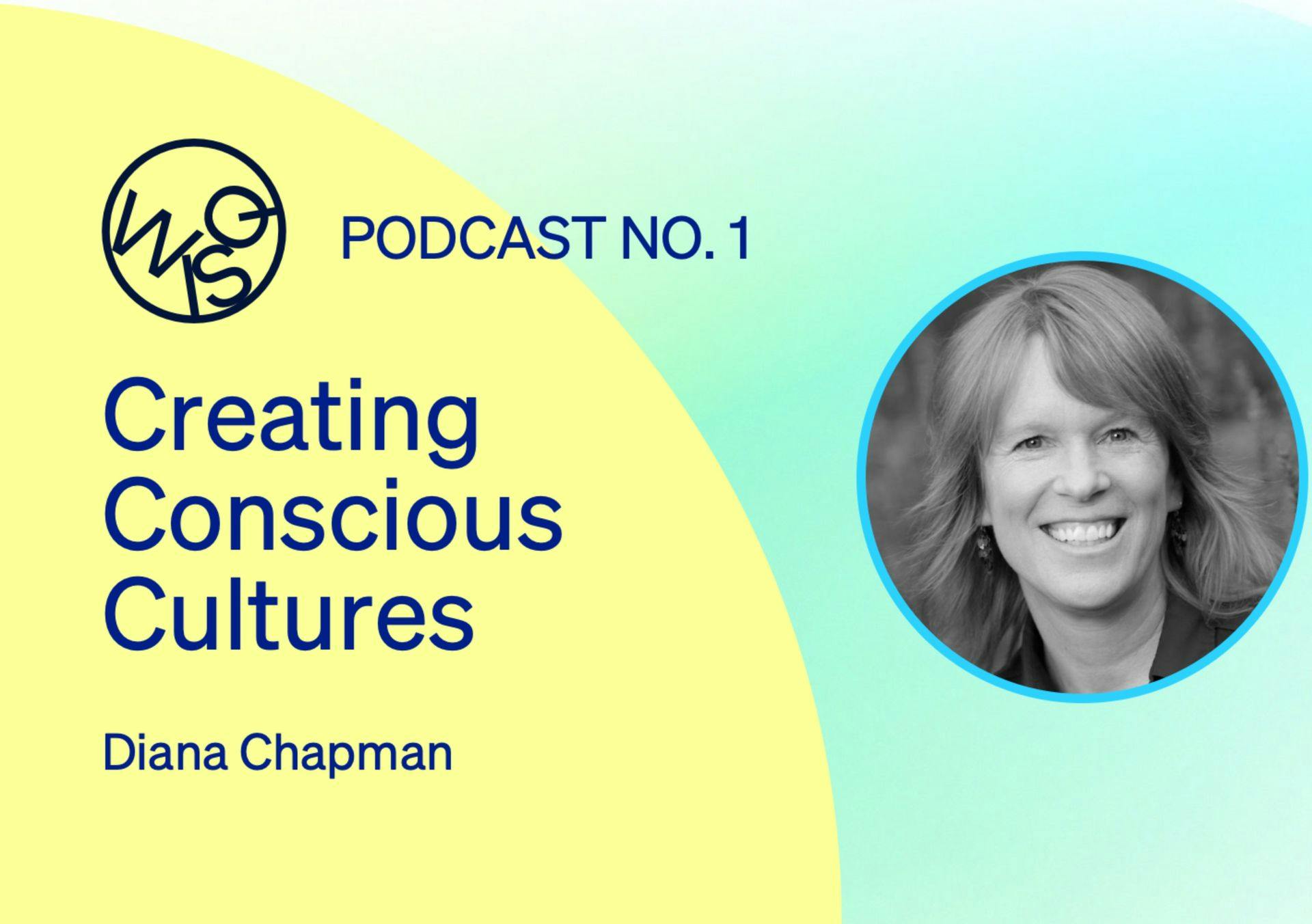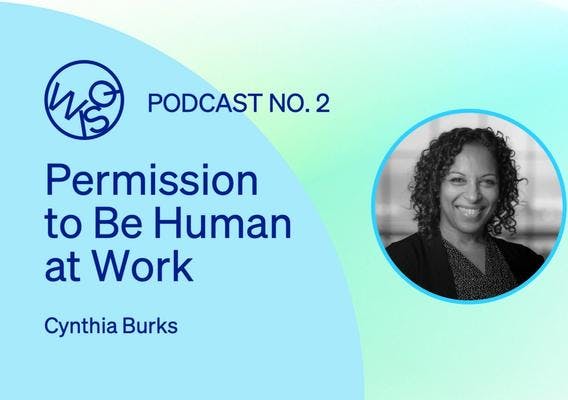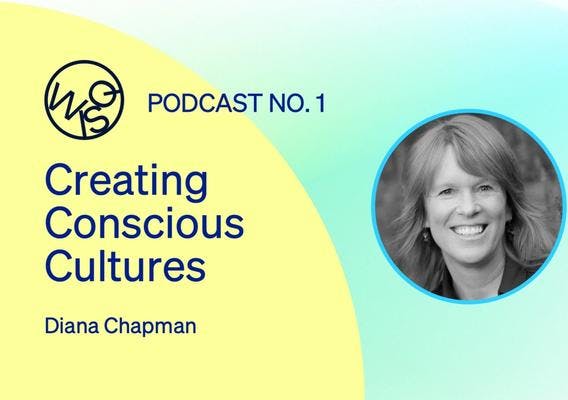Jim Barnett, CEO, Wisq, spoke with Diana Chapman, founding partner at Conscious Leadership Group and advisor to leaders, in the first episode of "Happy Here."
Just like an athlete embraces a mindset that allows them to be present and quick, Diana Chapman says, businesses can benefit from adopting an open, creative and relaxed mindset. Leaders can avoid drama in the workplace by creating an environment of learning and growing – and anyone who takes responsibility for their influence is a leader. Jim and Diana also discuss creating trust between teams, making decisions with a “whole body yes” and embracing a sense of play at work.
Get a transcript of their conversation below, and listen to the full episode on Spotify or Apple Podcasts.
Jim: Today, I'm so excited to be with our guest, Diana Chapman. Diana is an advisor to Exceptional Leaders. She's a founding partner at Conscious Leadership Group where she's worked with over a thousand organizational leaders and teams.
She's co-authored a best selling, and I've gotta say a really amazing book, the 15 Commitments of Conscious Leadership, A New Paradigm for Sustainable Success. Diana, welcome.
Diana: Thank you so much. It's such a treat to be with you.
Jim: It's really a thrill to have you on today. We're so excited to talk to you about a variety of topics and I thought it would be a great place to start. Maybe you could take a couple of minutes and just tell us what is conscious leader.
Diana: My definition of conscious leadership is, first of all, can I just be here now? And a lot of us aren't here now cuz we're either back worrying about that conversation we just had and did I do it right or we're out in the future anticipating what could go wrong. And so we're not letting ourselves just relax here.
If we are here, then can we be here in a non triggered, non-reactive state, which is easier so than done. We're wired to get triggered and reactive. And so learning how to be aware and interrupt that triggered reactive state is what I'd work with teams and leaders with to so that we can have a lot less drama in the workplace.
Jim: And how did you feel compelled to create, like, what was your vision for CLG, beyond just being an individual coach to leaders?
Diana: There's these Gallup pulls have been out for years talking about how disengaged people are at work, and I was thinking, wait a minute, this is where everybody spends the majority of their lives and they're disengaged.
That just sounds painful. And so I really wanted to see could I create new models and tools that people could use together? Kinda like playing a game, like could I introduce a game into a business setting where everybody learns the rules of the games and they play the game in a way in which they just get along so much better. They think more creatively, they have more. And work starts to become a really engaging place.
Jim: What does it look like when a company's committed to conscious leadership principles?
Diana: So first of all, we say we've gotta name the game, so can we all get co-committed?
So, co-committed means we all are gonna commit to certain ways of life. For example, I'm gonna commit to keep my agreements. And that's really a commitment between me and myself and you know, reality. But I'm gonna commit to key my agreements. I'm gonna commit to be candid and reveal versus conceal. I'm gonna commit to feel my feelings and let other people feel their feelings.
So these are some of the commitments that we would ask people to make. And then we make clear agreements. Amongst us about how we're gonna do that. So we're gonna meet at 4 pm today for this particular meeting, and everybody is gonna show up. And ideally we keep our time agreement. So bing, bing, bing, everybody pops up on the screen.
Or if we're at work, we're all in there at the same time and nobody has to sit around wondering, oh, what happened to so and so? And now we've gotta wait and we, we just don't waste our creative energy anymore because we're all playing the same game. So that's what I focus on first is let's get co-committed with clear agreements and what exactly does that look like? And then let's start practicing.
Jim: It's about actually fundamentally creating a conscious culture.
Diana: For sure. Right? It's like how do we collectively together all take responsibility for creating this environment in which we're all so engaged?
Jim: You recently wrote about scaling from presence, as opposed to scaling from below the line. Can you talk a little bit about what each of those would look like and why it's important to scale from a place of presence than below the line?
Diana: Yeah, I wrote that this last month because I don't know what's going on, but in the last couple of months with a lot of my clients, people are exhausted.
They're burnt out. And I just think like this is tragic they think in service of scaling and they believe like we all have to exhaust ourselves in order to grow. And from below the line, and we say below the line is when you're triggered and reactive, when you're below the line and scaling, it has this sense of urgency. Like, 'Oh gosh, we gotta get going.' And oh, you know, it's like it's-
Jim: Almost like a panic?
Diana: It's a panic, exactly. There's an anxiety, we contract and it feels like there's scarcity. And my argument is, Hey look, you're gonna get the same amount done whether you're contracting or in an open space. The difference is that open space is gonna be way less exhausting.
And then you get to have your energy back to be able to enjoy your life outside of work and other things that matter to you. And you still, I, my argument is will grow at least as much, if not more, if everybody has got more open, creative space to do that, because minds get more interesting when we're not contracted. Instinctual intelligence grows when we're not contracted. So, It's my experiences that people can move faster when they're more relaxed.
Jim: So practicing this conscious leadership doesn't mean you don't have preferences, you don't take action, you don't move quickly. But it's a different mindset. Say more about that.
Diana: Yeah, like let's think about it like an athlete. Let's try a basketball player. They gotta be quick. They're agile. They're moving around all over on the court. But there's a difference between doing that with a lot of open, free space and flow versus, 'Oh gosh, I don't know if I'm gonna be able to get the ball.'
There's a certain mindset they have to have that allows them to be so flowing and be able to be so quick and fast and be able to. You know, instantly be, know who to send the ball to, et cetera. Yeah. Conscious leadership is not like, 'Oh, we're all gonna sing kumbaya now' and go at this kind of slower pace. We can go fast, but how do you go fast and be relaxed? That's the core theme we're looking at.
Jim: On a unrelated topic, you talk about drama a lot. What does it mean to create a drama-free workplace or a low-drama workplace?
What do you have to be committed to, and how do you avoid creating drama?
Diana: Well, one of the things I see is so much drama happens because people wanna blame, you know, I can't have what I really want. Because leadership or that department over there is screened up for our department, and they're the reason why we can't get the product out or whatever it is.
People like to blame a lot. So one of the big things we say is, Hey, what if everybody stopped blaming and really took responsibility? Creating whatever is our less than ideal outcomes. And when we can do that, then we can learn from that and move on. And then we don't make anybody the bad guy. We all see each other as allies.
There's a connection we all have, and that creates a environment of learning and growing versus blame and criticism and resentment.
Jim: You talk from time to time about how it's important to encourage connection, intimacy, and I think you've used the word kin. Inside companies, like what does that do for companies?
Diana: What happens is when I go into teams, I ask them to answer the question, if you really knew me, you would know.
And it's really, I'm always so touched by how vulnerable people get. And it's really interesting when somebody says, Hey, have you really knew why my dad's going through cancer, and it looks like he's got a month to live. And then all of a sudden the colleagues go, I had no idea you were going through that.
And then all of a sudden there's this empathy that comes out. And then now in the next meeting, You're somebody I wanna listen to a little more and you're somebody I wanna support a little more. And so the more we can talk about our humanity, because everybody's got challenges and the more we can be real with one another about what's going on, the more I find that people then open up their minds and hearts to one another and then they're much more able to stand for, win for all.
The other thing I really like is the more I think of you like kin, the more I'd wanna treat you like, I'd want somebody to treat my mother or father or brother or sister or son or daughter if they were in that role. And that really brings out the best in each of us when that happens.
Jim: Yeah. And by the way, you've used that question when working with some of my teams, and it's been a phenomenal, and then the second round was always the more interesting one, which is if you really, really knew me.
Diana: Yeah, and you know, one of the things also is I find how much people are longing to be known. People really want to be known, not just for the role I play, but they wanna be known for the things they care about, their values, their hobbies, their passions. It's really important and when people get known for that, they feel more engaged.
Jim: That deep connection between being known, connecting and then engagement and results is profound.
Diana: Yeah. And then I think it's, you know, some people argue, wow, that takes time to get to know each other. And I say, slow down because you slow down a little bit and get to know each other.
Then the more I'll in tune you all are to each other, the faster I see people can go.
Jim: You mentioned that, that you're seeing a trend where leaders are more focused on balance. Picking up on that word, let's talk about balance more holistically.
Diana: It was really cool for a long time to everybody work themselves to the ground.
It was kind of like, it was bragging rights. Like, oh, I worked 50 hours, or 60 hours, or 70 hours, or whatever it was, and now I'm starting to see a break in all of that where people are like, yeah, that doesn't, that's not so cool anymore. Like, Have a life, be with your kids.
Jim: Happiness is cool.
Diana: Yeah, happiness is cool.
You know, people are starting to recognize, like it doesn't make sense to be in a marriage in which we're just two ships passing in the night. What, what are we doing here? And I think there's a new sense of like, there's maybe Covid helped, I don't know, but a new sense of like, there's more to life than just your work.
And the young people certainly are role modeling that for us as they're entering the workforce.
Jim: One of the gifts that you bring, this whole concept of conscious leadership is the concept of. And I know some might think that work should only be about work. Like play is not, doesn't have a place at work and you've stood for that not being the case.
Diana: So there are a lot of different ways to play at work and people often think play and they think of like childhood games. That could be one way to play. But there are many, many other ways to play. There are competitive games, there are collection games, there's storytelling, there's designing, there's, there's so many different ways human beings play.
And so, first of all, I think people need to understand and expand their vision of what play is, but why is play so important? One drama is incredibly entertaining. You've gotta find something more entertaining than drama if you wanna help eliminate it. And one of the things we know Trump's drama is play and ask every kid, what's your favorite part of school recess.
Why? Because play is so entertaining. We also now know, I think one of the latest studies I saw, children learn 40 times faster when they're. That's, that's ex, that's amazing. So if we're all trying to learn things, learning through play, we know all mammals learn best through play. So creating a high learning environment is highly encouraged or it grows a lot when people are playing more.
And then, you know, play just gets a lot of endorphins going and the laughter and all those good things that we hear about that make a difference in our wellbeing.
Jim: Yeah, that makes sense. I wanna make sure we talk about one thing before we end today, and that is one of the most important things that I've learned from you, which is this concept of a 'whole body yes.' What is a 'whole body yes'? And how can people use whole body yeses to bring more aliveness and happiness to their lives?
Diana: So most of us spend most of our lives making decision after decision about all kinds of things, and most of us learned often in school to make decisions using our heads, our intellectual intelligence, which is a wonderful thing.
But whole body yes. Says, hold on. There's more than just your intellect. There's also your emotional intelligence, which we now know has a lot of wonderful guidance. And then now instinctual intelligence, which I call bq body intelligence. So iq, eq, bq are three centers of intelligence that we can be with and listen to when we're making decisions.
So I support people in learning. What is it like to find a. With all your centers of intelligence engaged versus a no. And what I see is leaders, and my argument is anybody who wants to take responsibility for their influence in the world is a leader. So leaders who are listening to all three centers of intelligence and accessing their whole body of intelligence are gonna be far more effective in making thoughtful.
I love that. I, I mean, it, it just sounds ridiculous, but I use it when I'm trying to figure out what to order at a restaurant or something like that, and I just check in like, and say like, you know, do I want this or do I want that? And, you know, just
It's amazing. It is, and I say start with those kinds of things.
Actually start with, you know, which way you're gonna drive home if you have a commute and you can just a couple of options or what time you wanna have dinner tonight, you know, is it five 30? Is it six? Is it six 30? Listen to your whole body intelligence and make that decision. And then once you get.
Confidence seeing that those really pay off, then you can start using this in bigger and bigger decisions. And it, it reliably takes care of me when I honor my yeses and nos for my whole body.
Jim: You said something a second ago, I want to follow up on it and have you reinforce, cause I think it's really important for our listeners when, when you're talking about leadership and leaders, and I'm talking about leadership and leaders, we are not talking about just executives, we are talking about anybody.
Diana: Yeah, so I think one of the ways you really create more happiness at work is if everybody owns, 'I'm a leader here and I'm equally co-creating the experience here in our culture, and I'm equally co-creating the success of our business.' And while we all might have different roles and responsibilities, if we can hold it all as equal, there's an empowerment we all have because a leader is anybody who takes responsibility for their influence.
And ideally everybody owns how much influence they actually have. Because we all have a lot. And what I see is when people feel that they get so much more engaged and excited and happy about being part of this bigger thing.
Jim: Is there anything we haven't asked you about conscious leadership?
Diana: Well, there's one other thing that I think is really interesting, which is a lot of times we get reactive at work because we judge somebody over there for behaving a certain way.
And really what happens is what's going on is it's a projection. And a projection is I put onto you something that I don't either own about who I am or I don't like about who I am. And so instead, Owning it and accepting that part of myself, I'll project onto you and judge you. So for example, let's say you're irritated with a colleague who you judge as irresponsible.
It's likely because you haven't yet really owned or loved the irresponsible part of you. And so you then judge over there and create a na na na, and then that can. A difficult time collaborating with 'em, you're less likely to wanna listen to them, respect their opinions, get curious with them, et cetera.
So this is a place also where a lot of people get stuck in conflict is around these projections. And so it's pervasive. And it's every, it's everywhere. And it's what causes us to be so reactive. And so that's a thing that I like to come into teams and help people start to understand how we're all projected onto each other, causing our reactivity, keeping us from connection.
Jim: You also help teams learn to open up 'clearing.' Can you talk a little bit about what the clearing practice is and how that helps teams build more authentic and open communication?
Diana: Yeah. Well, the clearing is first and foremost, it's all about me. I've created a disconnection with you and I wanna come back into connection.
So I'm gonna use this model to figure out how I've created the disconnect. And so there's a set of questions about what were the facts of the situation and what did you, what stories did you make up and what feelings do you have? And at the very end of it, the, the final question really is the big payoff, which is, what is it that I have an aversion to over there that has created the disconnection for me?
And that's the projection part that I talked about just in a moment ago. And so when you can own that, own your projection and, and start to find that part of yourself and accept that, then you come back into connection with that other person, and they're not wrong anymore.
You still may not like their behavior, you still may say, 'Hey, I'd like you to follow through with what you say you're gonna do, but I'm, but I'm no longer disconnecting from you in a way that keeps me from being an ally for you.'
Jim: Great. If we put it all together, like everything we've talked about, your vision comes to life where all leaders are practicing conscious leadership. What do conscious cultures and organizations look like?
Diana: Well, first of all, I think they look like people who all just recognize we're just human. We're flawed. Everybody's got their challenges, and there's a real acceptance of that acceptance of being human and how challenging that is.
And there's a lot of empathy for ourselves and each other. And then from that, There's just a lot of, 'Let's learn together.' All these situations that we're creating, they're just here for us to learn. And that learning just gets way more interesting than wanting to be right and defending, and you're wrong, and oh my gosh, you know?
And that there's also a lot of real awareness about our impact on each other and how we can be supportive and nurturing versus antagonistic, and how we. Enjoy knowing each other. So that's the, that's the ultimate vision that I have.
Jim: I love that we share this passion for happy workplaces. Okay, last question: what's one thing that you do personally to be happier?
Diana: The number one thing I do is I really question when my mind wants to be right about the way I think I ought to be, or you ought to be, or the world ought to be. When I get like that, I get closed off from learning and I stop being as happy. I can get grumpy and resentful in all the things that come when one wants to be right.
So, I think learning to question our beliefs and see how the opposite could be true too, and hold things like more lightly so that we're open to other perspectives, I think is where, at least for me, that that probably is the number one thing I do to help support me being happy.
Jim: Well, thank you so much for sharing all those gifts with us today. This has been amazing.
Diana: You are so welcome. I really do wanna celebrate that you are one of those conscious leaders who I think role model this more than almost anybody. And I love being engaged with a team where everybody cares so much about each other and is enjoying the collaboration, and holds their opinions lightly, and is open and curious to other perspectives. You role model that so beautifully.



